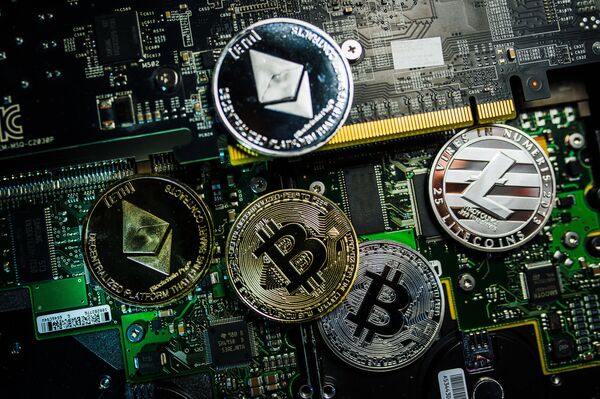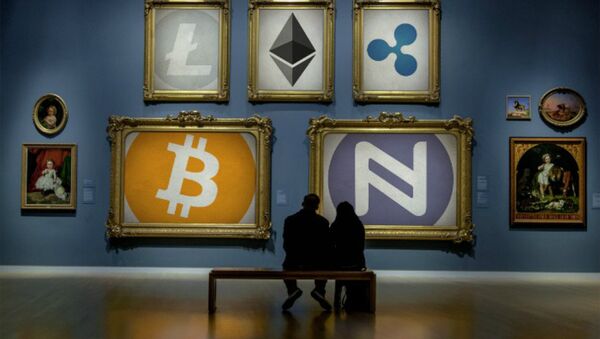China is reportedly mulling over the creation of an East Asia "stablecoin" – with the Japanese yen, Chinese yuan, Korean won, and Hong Kong dollar pegged to it – in a move which may bring global competition for supremacy in digital currencies to the next stage, as Japanese financial newspaper Nikkei noted last Sunday.
The plan was purportedly outlined by Neil Shen, a member of the National Committee of the Chinese People’s Political Consultative Conference (CPPCC) and founding partner of Sequoia Capital China, on 21 May. If implemented, a regional stablecoin may bolster cross-border transactions and reduce the usage of the US dollar within the region.
What's Behind China's Interest in Digital Coins?
The ambitious project did not come out of the blue as China has already been testing its sovereign digital currency in Shenzhen, Suzhou, Chengdu, and Xiong'an since April 2020, according to China Daily. While the digital currency idea has been floated in the People's Republic since 2014, in October 2019 Xi Jinping pushed forward with the initiative.
"There are multiple reasons for China’s interest in launching a digital yuan", explains Dr Garrick Hileman, head of research at Blockchain.com.
According to the cryptocurrency researcher, Beijing's potential objectives include:
· making China’s currency more competitive internationally with the US dollar, the world's dominant international trade and reserve currency;
· advancing digital innovation and leveraging distributed ledger or blockchain technology, which was made a national priority last year and will underpin a digital yuan;
· responding to internal Chinese concerns over the dominance of electronic payments by AliPay and WeChat pay;
· last but not least, the Chinese state-backed digital yuan would give the government and banking sector more direct control and insight into financial flows, customer data, and so on.
Beijing's heightened interest in creating its own digital currency coincided with the prolonged trade row between China and the US, Washington's sanctions spree, and the recent spat over the origins of the coronavirus pandemic. A sovereign digital currency would help avoid settlements in US dollars and blunt the impact of any sanctions and threats of exclusion both at a country and company level, as China Daily suggested this April.
Digital Yuan vs Bitcoin
So, what is China's new crypto about and how does it differ from the world's most recognisable digital currency, Bitcoin?
"The digital yuan and Bitcoin are very different and do not really compete head-to-head", elaborates Dr Hileman.
The most obvious difference is that Bitcoin today is "primarily used as a scarce digital 'hard' asset, or store of value, and has more overlap with other stores of value like gold", the researcher clarifies, adding that while Bitcoin can be and is used for payments, it is not widely used as a currency yet. In contrast, China’s digital yuan is focused on payments.
"Even more important perhaps is their design differences", he continues. "Bitcoin is relatively decentralised, without a single controlling entity behind it. In contrast, the Chinese digital currency will be centralised and will not possess the censorship resistance or trust minimisation that has made Bitcoin popular with its tens of millions of users around the world".
Given the above facts, it is highly unlikely that the digital yuan would be able to depose Bitcoin, he remarks.
At the same time, the Chinese crypto offers clear benefits to its users making their financial operations quick and seamless. Thus, according to the South China Morning Post, an owner of a digital wallet would not need a bank account to hold and conduct transactions in crypto yuans. In contrast to AliPay or WeChat, settlements in digital yuans would be possible even without an internet connection: a transfer could easily be made by two users touching their phones together.

'Currency Competition is a Very Positive Development'
Touching upon Nikkei's recent report about the proposed East-Asian stablecoin which is expected to be connected with the digital yuan, Dr Hileman recommends taking a wait-and-see approach.
"It is no secret that China seeks greater financial autonomy and the idea of exploring multiple digital currency initiatives, like this private sector led initiative described this month, makes sense", he says. "However, when trying to assess such pre-launch news it is important to remember there have been many false rumours and delays around the Chinese digital currency design and launch timetable".
Thus, on 26 May, Yi Gang, governor of the People's Bank of China (PBOC) highlighted that "there is no timetable" for the launch of the Chinese digital currency despite progress in its research, development, and testing.
Nevertheless, the researcher hails the emergence of new interesting regional currency initiatives, including one in Western Africa that is designed to replace France’s historic currency role there.
"Currency competition is a very positive development, particularly around the still stubbornly high cost and time delays associated with international payments and remittances", Dr Hileman observes. "These costs and delays hit the economically less well-off especially hard. Overall, I’m optimistic that competition between open source cryptocurrencies like Bitcoin and new public sector digital financial innovation can make sending money as fast and cheap as sending an email or text message".
He points out that the US "is also considering launching a central-bank digital currency more widely". However, there is significant political and banking opposition to this idea, according to him.
"If the US dollar fails to innovate and keep up then we could see migration away from the dollar to other currencies", Dr Hileman emphasises.


